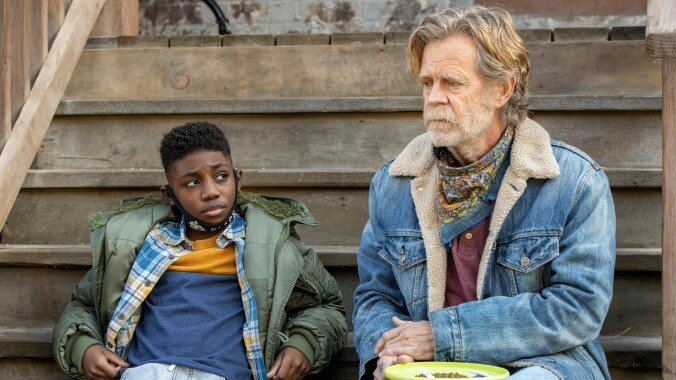Shameless’ end-of-life storytelling continues to disappoint, not that we expected otherwise


While it’s touch-and-go when it comes to the canonicity of Shameless’ mid-credits sequences, “DNR” begins with the Gallagher children waking up to the realization that Frank did indeed steal Nighthawks from the Art Institute of Chicago. But although Lip has a few comic beats trying to keep the painting hidden as he works to fix up the house to sell, by episode’s end it’s on an el train covered in sparkly stickers as though the theft never happened.
So why have Frank steal it, then? There’s a base value in terms of the mythos of Frank Gallagher: everyone agrees there’s no way someone could have ever stolen the painting, so the fact that he did is one last gasp of the Frank Gallagher that once existed, and who is deteriorating rapidly. But the episode doesn’t really dwell on that, and instead uses the theft of the painting to force the Gallagher siblings to actually be concerned about his whereabouts: they’re not willing to leave him unsupervised in case he tells someone about stealing the painting and implicates them all, and so he ends up tagging along with Liam while he works to get himself into a STEM school. And it’s on that journey—where Frank steals a delivery van, fights his son to the ground, and forgets what they’re doing every half-hour or so—that Liam fully realizes that he is the only one left who doesn’t hate his father, and thus the only one feeling the weight of responsibility that comes with someone in your family having dementia.
As I wrote about last week, Shameless has no real clear grasp on Liam’s character: he’s definitely the one who has spent the most time with Frank in later seasons, but he’s also shown himself to be quite pragmatic, and so the idea that he’s suddenly feeling burdened about taking care of Frank doesn’t necessarily fully track. And again, while he’s not wrong that all of his siblings hate Frank and don’t want to take care of him, he still isn’t actually talking to any of them about it even after just learning an important lesson about the value of doing this last week. And given that Ian and Mickey just went through a whole story about how even racist, homophobic invalids deserve quality end-of-life care, does Liam really think that none of his siblings would at least be alarmed by what he experienced? “DNR” ends with Frank taking Liam along with him as he get a “Do Not Resuscitate” tattoo, but it really should have ended with a family meeting where Liam reported that we are officially past the point where there’s a question whether Frank’s dementia is real or him being an asshole at any given moment.
As with much of Shameless’ “end-of-life” storytelling, Frank’s worsening condition is a story that’s better the less you think about it. Macy’s performance is selling it fine, but I just don’t have enough empathy for Frank, meaning the show’s effort to generate it out of thin air is going to inevitably fall short. The same goes for Debbie’s fear of being alone, which is something she definitely should have thought about before she became the world’s worst person and alienated everyone in her life systematically. Watching her beg a poor woman renting out the room above her garage to let her move into her house so she isn’t alone is not absurd enough to be funny, but I don’t care enough about Debbie for it to be sad, and no amount of refrains of “All By Myself” can channel Clueless energy to generate something meaningful. This idea that she’s nostalgic for Gallagher insanity is a cute beat during the fisticuffs that serve as the climax for Lip and Mickey’s respective journeys in the episode, but it’s a mistake to pin this story on the audience feeling bad that instead of getting a nice two-bedroom apartment and letting Franny have her own bedroom, she would rather move them into a single bunk with three other children thanks to her own insecurities. If there’s someone out there who is still empathizing with Debbie Gallagher in this the eleventh season of Shameless, I hope scientists are reaching out to study their brain to understand this improbability.
By the end of “DNR,” most of the show’s characters seem settled into some vision of a future, although the pace at which they get there is a reminder that there’s no easy way to end a show without a clear serial engine—like any soap, Shameless could go on forever, and it’s clear that the show didn’t have enough runway to make this feel entirely natural. The show has admittedly laid enough groundwork with Veronica’s disillusion with Chicago’s gentrification to sell the idea that Kevin would be one good bartending shift away from abandoning the Alibi and moving to Louisville, but it’s still a bit too rushed for me to be convinced it’s going to stick. However, at least Veronica didn’t put in an offer on a condo without even consulting Kevin, which is what Ian inexplicably does on a West Side apartment after Mickey initially freaks out at the idea of moving out of the South Side. I suppose it’s a necessary fight to create the climactic brawl between Lip and an angry Mickey, but the way we get there again feels rushed for no particular reason. They never give the conflict between Ian and Mickey room to breathe, making it hard to believe that Ian would ever make such a rash decision—he signed a lease without his knowledge!—in this way if not for the fact the show is ending and there needs to be conflict. The writers never figured out how to tap into the specific history of these characters when depicting their marital conflict, and this is another instance where there’s some emotional truth in their reactions, but not in their actions, which elides the nuances of their past in a way that remains a disappointment.
And while I feel similarly about Lip’s storyline, I will admit that the show’s rushed approach to an ending is working best with his character arc. Yes, it was very dumb when he fixed up a house he was renting on a handshake deal, and the show’s way of destroying his escape hatch by having Kevin destroy the Born Free heist deal arbitrarily was a joke, but Jeremy Allen White is extremely good at capturing Lip at his lowest, and I like where his character has landed here at the end. He’s putting all of his energy into fixing up the house and moving on, but he’s resisting mechanic jobs that don’t give him the future he imagined, and watches as his passion project drives away at half its value because he has to sacrifice it for short-term gain in order to fix the gas lines. It’s still a huge missed opportunity that the show effectively reset his character arc after he was kicked out of college, ignoring the fact he’s a genius who threw away his chance to get out of the South Side, but his subsequent character arc is best-suited to the emotions of this final season: he has a family to support, and he knows what needs to be done, but he resents what it says about his failure, and he carries that weight in ways that are self-destructive. Outside of the show too casually breaking his sobriety—when Ian brought up a meeting, it made me realize they still haven’t really unpacked that—the Lip story has mostly worked as drama, which is something that can’t be said for anything else the show is doing this season.
I said above that the theft of Nighthawks was mostly pointless, but I suppose the writers are also likely intending a degree of thematic purpose. On the Art Institute of Chicago’s website, the report that artist Edward Hopper admits his painting inadvertently depicts “the loneliness of a large city,” and there’s no question that’s a theme running through “DNR” as the Gallaghers face a life independent of one another. But are we pretending that the characters weren’t consciously siloed by the writers five seasons ago, rarely interacting as a family? And do we want to address the fact that no one has thought to inform Fiona—who plausibly owns the house, and is Liam’s guardian, and also might theoretically be able to help out with the current situation—about what’s going on, an isolation the show has never justified? The website also writes that the painting’s subjects “seem as separate and remote from the viewer as they are from one another,” and it’s there where I think you’ll find the proper parallel for the state of the Gallagher family, and that’s not where you want a show that thinks it’s a family sitcom to be only two episodes from the finish line.
Stray observations
- Carl’s police storyline finally reaches its logical conclusion, which it did not earn in any way: Carl realizes that while he loves power and authority, he doesn’t agree with the corruption of the police force, which he…somehow hadn’t realized before now? The show didn’t have the runway to address how Carl missed the corruption and inequality before now, or why he now realizes it’s wrong, and the choice to pretty much solely lean on issues of class instead of addressing racial inequality here at the end felt like a cop out, pun intended because the story was never serious enough for me to care about demeaning it.
- Last week someone pointing out that Kate Miner might not be doing sex scenes because she’s pregnant, and I’ve got to be honest and say I’m embarrassed I didn’t notice the flowy tops and large bags held in weird positions before now. Congrats to Kate.
- That looked like a high rise, did Ian not hear Mickey about the incompatibility of stairs and bazooka transport?!
- So, Ian and Mickey were able to rent an apartment on the day, no questions asked, as two ex-felons on parole who run their own company? I mean, I know they’re imagining a situation where apartments are vacant and people are desperate to rent, but I still feel like there might be an application process?
- Can you imagine seeing a homeless woman at a park and being like “Hey, how did you become homeless” without even introducing yourself and trying to engender some type of rapport?
- I wondered for a second if the rich landlord Carl arrested was the one involved with Fiona’s exit storyline, but then I remembered I couldn’t picture what that dude looked like for the life of me, and then I just decided it wasn’t worth checking and chose to presume it wasn’t.
- While Kevin actually did prove himself capable of bartending, Veronica lying and saying she knows the Obamas seems like it won’t actually get her this congressional job she’s being offered by someone who is not said Congressman. Also, if this Louisville storyline was their pitch for a spinoff, I am…not convinced.
- “Hit my husband again and I’ll fucking kill you”—Ian, I get “stand by your man,” but also maybe apologize to your brother that your own rash decision-making is what put Mickey in the bad mood that created the conflict? Just a thought?